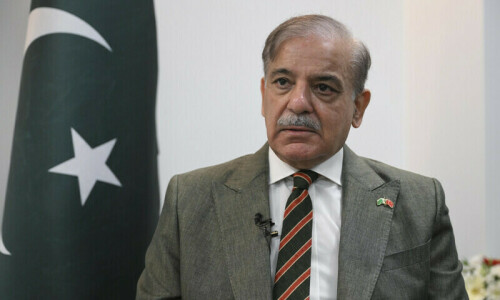Under the International Monetary Fund’s (IMF) influence, the federation and the provinces have committed to taking appropriate measures to remove distortions in fiscal federalism.
Provincial revenues are to be significantly improved while renewed efforts are made to balance federal and provincial spending. Though it is a challenging agenda, as past experience shows, one expects that serious efforts will be made this time by the authorities to honour their commitment to the Fund.
For this year, the provinces are required to produce surpluses in excess of Rs1.215 trillion, says the former governor of the State Bank Shahid Kardar. He argues: “Why would they accede to such a ridiculous demand to generate surpluses for Islamabad to spend?”
“The mind-boggling profligacy in government spending,” analysts at Business Recorder point out, “resulted in parliament retrospectively approving a record Rs9.4tr in supplementary grants to expenditure overruns from the previous year’s amount of Rs1.91tr, a whopping increase of 389 per cent.”
The IMF, economists and political parties are pressuring the government to curtail its own expenditures instead of imposing more taxes on the people
To improve federal fiscal balance, an ambitious effort is being made through the FY25 budget to increase tax revenues, while efforts are also underway to reduce the federal spending size.
In a positive development, to quote the IMF, “Pakistan’s federal and provincial governments would sign a new National Fiscal Pact to align their spending with the 18th Constitutional Amendment. The pact envisages ‘higher provincial spending for education, health, social protection, regional public infrastructure investment, enabling improved public service provision’. The provinces will also take steps to increase their own tax collection efforts, including sales tax on services and agricultural taxes,” the IMF concludes.
The provinces have significantly improved their collection of the sales tax on services since the subject was devolved a decade and a half ago. According to the Finance Ministry, Sindh collected Rs100.56bn, Punjab Rs101.08bn, Khyber Pakhtunkhwa Rs18.72bn, and Balochistan Rs9.66bn in the first half of FY24.
The sub-federations have now committed to working with the IMF to transition from a positive to a negative list approach, which implies that all services not explicitly exempt will be taxed. They have also agreed with the Fund to amend the existing provincial laws by October 2024 to align them with the federal income tax in order to levy a standard tax rate on agriculture income. The new system of taxation will be effective from January 1 2025.
In 2010-11 the total number of federal employees was 829,000, which was largely steady until 2016-17 when a sudden jump of 137,000 new entrants raised the total number to 966,000
The maximum tax rate on agriculture income is not yet clear, with options reportedly ranging from 29pc, 35pc and 45pc. The sub-federations have also agreed to rescind any exemption for the livestock sector.
Though total Agricultural Income Tax (AIT) collection currently ranges between a meagre Rs3-5bn, business tycoon Arif Habib estimates that agricultural taxes have the potential to generate up to Rs1.2tr, which could provide relief to other sectors.
The Shehbaz Sharif government is under pressure from independent economists, social activists and political parties to curtail its own expenditures instead of imposing more and more taxes on the people.
The latest committee formed to reduce the federal government’s size is expected to complete its information-gathering process regarding the unnecessary departments in the ministries of Information Technology, Kashmir Affairs & Gilgit-Baltistan, States and Frontier Regions, Industries and Production, and National Health Services. It will present its proposals to the cabinet by the first week of August.
After July 19, similar information will be sought from other ministries, and recommendations regarding department closures or mergers will be tabled.
Critics argue that Prime Minister Shehbaz is faced with the challenge of undoing the bureaucracy, which has thwarted successive governments’ efforts to slash the bloated federal government.
Ignoring the recommendations of two austerity committees, which Mr Sharif himself had formed earlier, and assigning a third one under the chairmanship of the finance minister to right-size the federal government is puzzling.
It is alleged that the then-cabinet approved PTI’s major restructuring plan for the federal government, which included retaining 325 federal government entities out of the total 441, but it has yet to be implemented because of the bureaucracy’s reluctance.
On the recommendation of Dr Ishrat Husain’s Task Force on Institutional Reforms, the Imran Khan cabinet approved the privatisation or transfer of 43 government entities to Sarmaya Pakistan Ltd, the transfer of 15 bodies to provincial governments, Islamabad Capital Territory and Gilgit-Baltistan, the liquidation or closure of eight organisations, and the merger of 32 entities.
According to Dr Husain, in 2010-11 the total number of federal employees was 829,000. This strength remained largely steady until 2016-17 when a sudden jump of 137,000 new entrants raised the total number to 966,000.
Like the last Austerity Committee of the Sharif government, the PTI government’s Task Force on Reforms also recommended the abolition of 71,000 posts lying vacant for a year or more, but the proposal has not been implemented so far.
In view of past experiences, Prime Minister Shehbaz says he would not tolerate any laxity in the implementation of the government’s downsizing agenda: “The only thing that will make a difference is action and implementation.”
Published in Dawn, The Business and Finance Weekly, July 22nd, 2024














































Dear visitor, the comments section is undergoing an overhaul and will return soon.